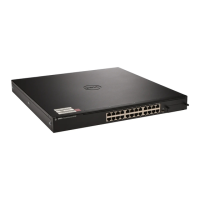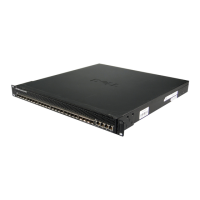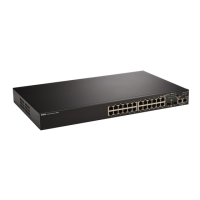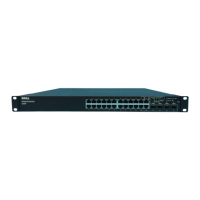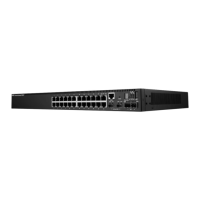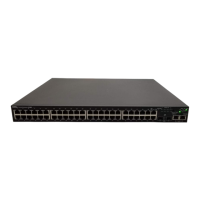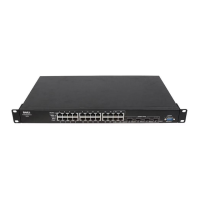Stacking Dell PowerConnect Switches: 8132, 8132F, 8164, 8164F
24
Notice the two 40G QSFP+ ports represented by interfaces F01/1/1 and F01/1/2. These two interfaces
will be used for stacking in the example below, though any of the interfaces listed may be used.
Perform the following commands to convert each desired port to Stack mode.
console#config
console(config)#stack
console(config-stack)#stack-port fortygigabitethernet 1/1/1 stack
console(config-stack)#stack-port fortygigabitethernet 1/1/2 stack
console(config-stack)#show switch stack-ports | include Stack
Stack Stack Link Link
Fo1/1/1 Stack Ethernet Link Down 40
Fo1/1/2 Stack Ethernet Link Down 40
The Configured Stack Mode is now Stack, but the Running Stack Mode is still Ethernet. The Running
Mode changes to Stack upon reloading the switch, as instructed below.
Save the configuration to the Startup-Configuration.
console#copy running-config startup-config
This operation may take a few minutes.
Management interfaces will not be available during this time.
Are you sure you want to save? (y/n) y
Configuration Saved!
Remove power from the switch.
Note: Hot insertion of units into the stack is not supported. Do not connect a new member to
the stack while the new unit is powered up.
Follow the steps in the following section to properly add the stacking cables and complete the process.
Ring vs. daisy-chain topology
If the original stack is cabled in a ring topology where a stacking port on the last switch is connected to
a stacking port on the first switch, the entire stack continues to work correctly through the process of
adding a new switch regardless of where the new switch is cabled within the stack. This is due to the
built-in resiliency of the ring topology that allows all switches to remain in communication with each
other in the event a single link or switch is lost or removed.
When adding a switch to a daisy-chain topology stack, add it to one end of the stack and not in the
middle. Adding to the middle requires breaking the daisy-chained stack which will cause the stack to
split, creating a new Master on the group of switches that lost contact with the original Master. This

